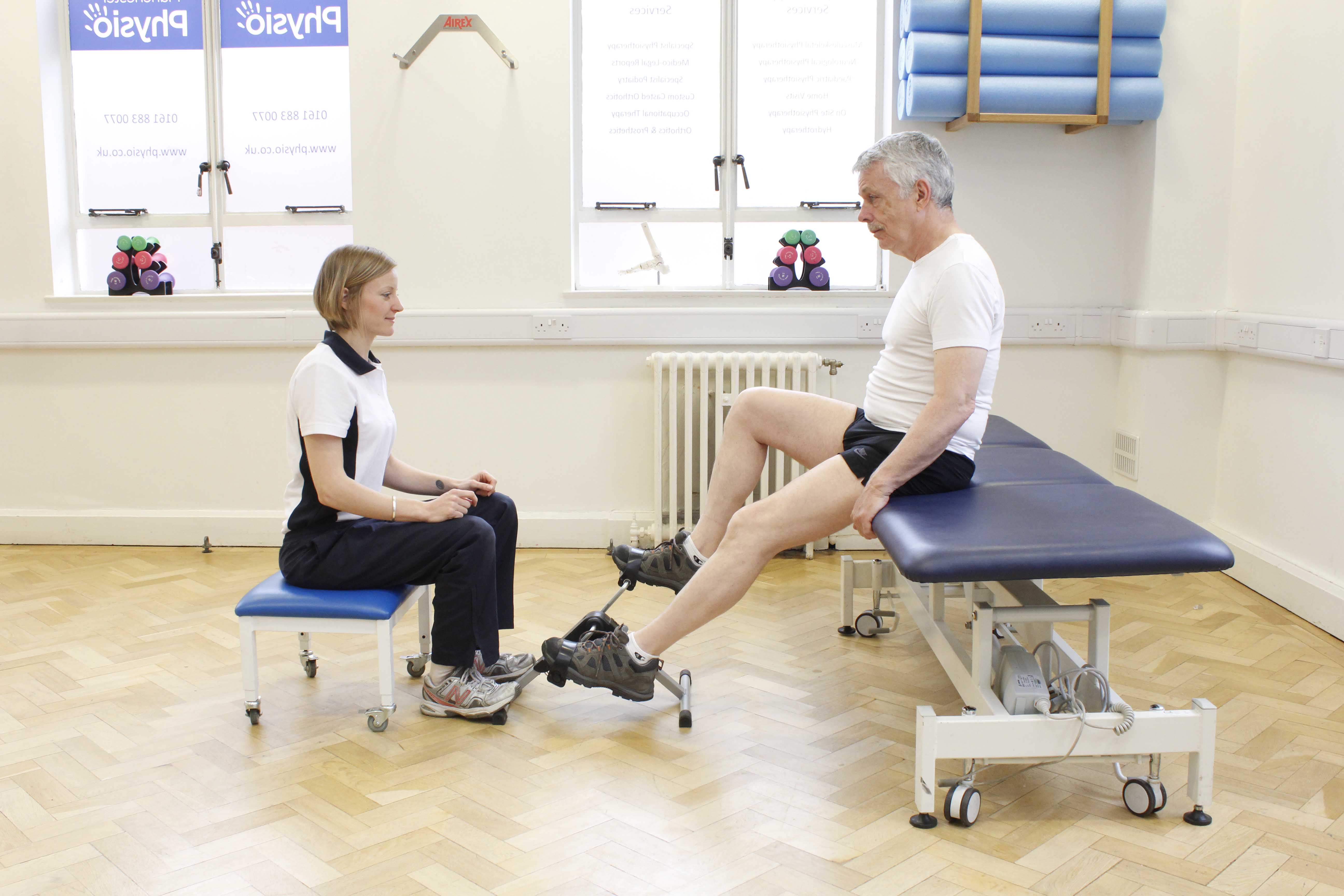What is Pleurisy?
The lungs are large, filling the chest cavity and pressing against the inner wall of the chest. The lungs are covered by a close fitting, thin lining called the visceral pleural. A second thin lining, called the parietal pleura, covers the inner wall of the chest cavity. Between these two layers is a small amount of pleural fluid to reduce friction as the two surfaces move against each other during the action of breathing.
Pleurisy describes sharp chest pains that result from inflammation of the Pleural layers and the subsequent friction as these layers rub together. Pleurisy is usually symptomatic of other underlying conditions, indeed it can be either a cause or result of pleural fluid retention called Pleural Effusion.
 Above: Improving lung function and exercise tolerance with supervision from a physiotherapist
Above: Improving lung function and exercise tolerance with supervision from a physiotherapistWhat causes Pleurisy?
The mechanical cause of chest pain that we refer to as Pleurisy stems from agitation of the pleural surfaces through friction. This can occur from a decrease in pleural fluid increasing friction of the two pleural surfaces. An increase in pleural fluid can excessively separate localised sections of the pleural layers causing uneven movement. There may also be existing inflammation of the pleural layers from another underlying condition. The net result is the agitation of the phrenic nerve that innervates the parietal pleura of the chest wall, sending sharp stabbing pain signals to the brain.
Some of the underlying conditions that can lead to pleurisy include;
- Infections, either viral or bacterial.
- Autoimmune diseases.
- Malignant tumours
- Direct physical trauma
- Inhalation or exposure to caustic substances, such as chemicals or drugs.
- Many types of respiratory condition.
What are the symptoms of Pleurisy?
The principle symptom of Pleurisy is pleural rub, the friction that occurs between the inflamed surfaces of the two pleural layers. The normal action of breathing is sufficient to cause movement between the pleural layers, but any large or sudden movements such as coughing or deep breaths will cause extra pain.
Your doctor will examine you for signs of other respiratory conditions or underlying illness, which could include a wide variety of symptoms. Other common signs specific to pleurisy include;
- Shallow breathing, often rapid to compensate for lack of volume.
- Wheezing if sufficient lung capacity is impeded.
- Coughing, can be sputum productive if underlying infection present.
How is Pleurisy diagnosed?
A doctor can confirm a diagnosis of Pleurisy following a detailed investigation of your symptoms, medical history and using specific tests to rule out other possible conditions. If you suspect you have Pleurisy you should seek an assessment with your doctor. Once diagnosed we can assess your current level of lung function and target treatments accordingly.
For more information on how physiotherapy can help treat Pleurisy, or to book yourself an assessment, please contact us via email at office@physio.co.uk or ring us on 0330 088 7800.
What would a physiotherapy assessment for Pleurisy involve?
At Physio.co.uk, we want to gain as much information as possible about your condition to ensure we give you the best treatment. In your first appointment with us, our physiotherapists will carry out an assessment which has two parts:
Subjective
A discussion between you and our physiotherapist to find out what symptoms you are experiencing, and how your condition is affecting you and your lifestyle.
Objective
An assessment to discern the presence of any pain, your current breathing pattern, respiration rate, lung volume and a series of special tests to identify the presence of any mucus retention and lung function impairment.
There can be great variation in the symptoms displayed, depending on the progression of the condition and any complicating factors. The assessment process will be important in identifying your current symptoms and needs, so that treatments can be targeted and effective.
What would physiotherapy treatment for Pleurisy involve?
At Physio.co.uk, Our physiotherapists will ensure you specialised treatment for your Pleurisy. Depending on the severity and duration of your condition, your treatment may involve:
- Secretion clearance:
- Effective / productive coughing techniques.
- Postural drainage in sitting and lying.
- Manual assistance, including percussion, vibrations and shaking.
- Breathing technique retraining:
- Controlling respiratory rate
- Diaphragmatic breathing
- Controlling / reducing breath volume
- Relaxation breathing exercises
- Education and Advice:
- Illness cause and progression.
- Effects of environmental and allergen factors.
- Medication management
At Physio.co.uk you will experience a personalised treatment session. Each appointment will be aimed at returning to your everyday activities and what you enjoy.
How can I arrange a physiotherapy assessment for Pleurisy?
If you have been diagnosed by your doctor as having Pleurisy and are suffering from symptoms affecting your breathing and lung clearance, you would benefit from an assessment with one of our experienced respiratory physiotherapists.
You can contact us directly to arrange an assessment and we can advise you if further treatment is recommended, and give you advice on self-management. To arrange an appointment please email office@physio.co.uk or call 0330 088 7800.
Summary
At Physio.co.uk, our respiratory physiotherapists can provide specialist assessment and treatment for people with Pleurisy. We can apply a range of therapy techniques and advice to manage your symptoms and maintain the best possible level of lung function and comfort. We can also advise on activity modification to make daily living easier. Along with advice for you and your family on appropriate self-management techniques to maximise your functional ability between therapy sessions.
For more information on how physiotherapy can help treat Pleurisy, or to book yourself an assessment, please contact us via email at office@physio.co.uk or ring us on 0330 088 7800.

 0330 088 7800
0330 088 7800





































